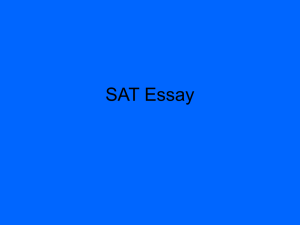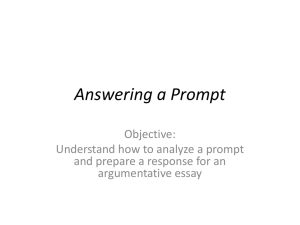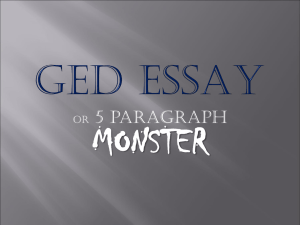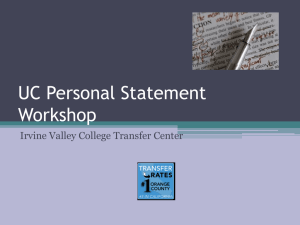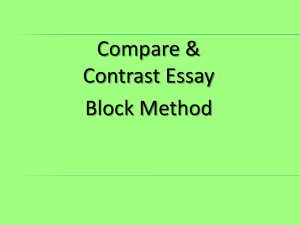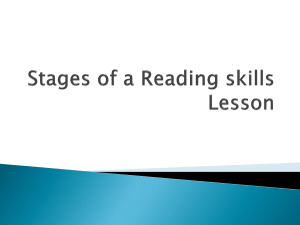PowerPoint
advertisement
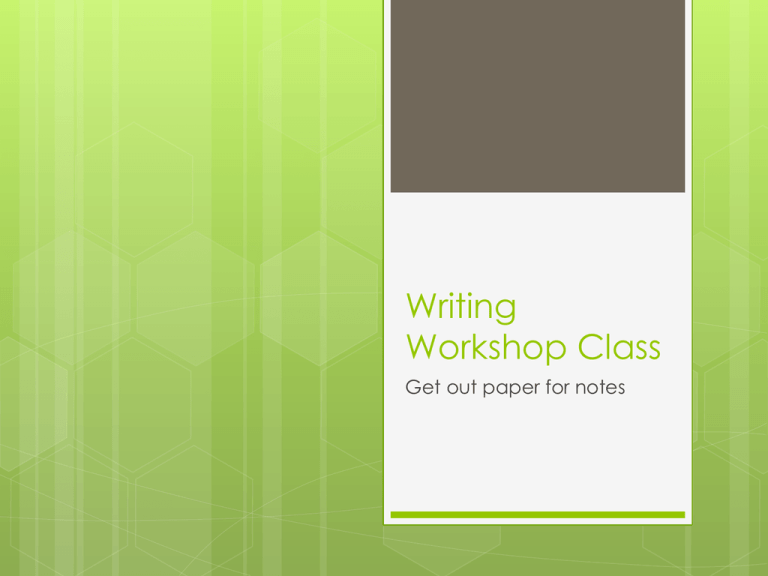
Writing Workshop Class Get out paper for notes Standard Standards 10/13/14 W2: Write Date Taught informative texts to examine and convey complex ideas, concepts, and information clearly and accurately through the effective selection, organization, and analysis of content. Text Date Tested Example essays 10/27/14 Objective Today you will learn how to properly read a writing prompt and determine your next step. Prompt The purpose of an essay prompt is to inspire a response in the form of an essay, which will test your writing, reasoning and analysis skills. What does the prompt even MEAN?! Task -read the prompt and determine what the prompt is asking you to do. Make notes on your prompt to guide you. Look for the verbs Issue- What is the issue/subject you need to write about? Purpose-What is the reason for writing? What are you trying to get your audience to understand? •Expository - writing informative and explanatory texts to examine and convey ideas and information clearly •Persuasive - writing opinions on topics or texts and supporting a point of view with reasons and information What does the prompt even MEAN?! Please read “The Secret to Raising Smart Kids” by Carol S. Dweck. Dweck is a professor of psychology at Stanford University. In this text, she develops several central ideas. After you have read, determine two central ideas from the text and write an essay that both summarizes and analyzes how these central ideas are developed, including how they interact and build on one another over the course of the text. Cite strong and thorough evidence from the text to support your analysis. Follow the conventions of standard written English. Write your essay in the space provided on the next pages. What does the prompt even MEAN?! Please read “It’s Not You, It’s Me” by Annie Murphy Paul and “the Perils and Promises of Praise” by Carol S. Dweck. After you have read the texts, write an essay that analyzes how Dweck and Paul each use and refine the meaning of the term intelligence over the course of their articles. Be sure to also discuss the similarities and differences between their definitions. Cite strong and thorough evidence from both texts to support your analysis. Follow the conventions of standard written English. Write your essay in the space provided in the next pages. What does the prompt even MEAN?! You have now read “Reading for Pleasure is in Painful Decline.”In this text, Stephen L. Carter makes an argument regarding the impact of the decline of pleasure reading. Write an essay in which you determine the author’s point of view and explain how the author uses rhetoric to advance that point of view. Be sure to cite evidence from the text to support your analysis. What does the prompt even MEAN?! You have now read“The Decline of Newspapers is Bad for the US.” In this text, Laura Finley develops several central ideas. Determine two central ideas of the text and write an essay that analyzes how the author develops these ideas over the course of the text, including how they interact and build on one another. Be sure to cite evidence from the text to support your analysis. Follow the conventions of standard written English. What does the prompt even MEAN?! have now read “Should the Driving Age Be Raised to 18?” In this text, two points of view are presented, one by Representative John D’Amico, and the other by Alex Koroknay-Palicz. Write an essay that analyzes the two different points of view, explaining how each is conveyed in the text. Be sure to cite evidence from the text to support your analysis. Follow the conventions of standard written English. You What does the prompt even MEAN?! Based on the article, “Schools in Ferguson Area Prepare for an Emotional Opening Day,” summarize in your own terms the advantages and disadvantages of discussing the happenings in Ferguson, Missouri in the classroom. Be sure to cite evidence from the text to support your summary. Now annotate! Annotation: to add notes to a text or diagram giving explanation or comment It helps you interact with the text and therefore comprehend more. What to write down while annotating? Remember to do: what the prompt is asking you What did the prompt tell me to look for? What is the issue in this article? Should I be comparing the two articles, summarizing the articles, forming an opinion about them….? What is the title? Who is the author What to write down while annotating? Ask questions: Are you confused about something? Write the question down in the margins. React to what you read: Maybe you read something that just made you mad, startled you, or brought you to tears. Write down your reaction to the text so you can remember later. What to write down while annotating? Locate important passages: Is there a quote that you think is important or thoughtful? Is there an idea you think might be worth remembering? Is there a ‘big idea’ that is at the foundation of the article? These are important to locate, as they are what you might quote in your investigation or written essay later. What to write down while annotating? Make connections: Maybe something you read reminds you of an experience you’ve had or parallels a part of your life; record these connections and they will help you find meaning and relevancy in what you read. What to write down while annotating? Define new words: Too often, reading comprehension problems occur because readers don’t understand words. It’s not too much trouble to look up the word in the dictionary. If you physically can’t look up the word as you encounter it, highlight it in the moment and look it up at your first opportunity. CONTEXT CLUES will come in handy. After you read… Summarize what you’ve read: In the empty space at the end of a page, rewrite the article noting the essential points, using only a couple of sentences. You might find that doing so will help you understand what you just read. Why it’s important to annotate Even though annotation can feel like a burden, its’ an important part of understanding what you read. Choosing not to do so is choosing to reject a strategy that will help you become a more thoughtful and thorough reader. Task: Annotate Missouri. the articles that cover Jefferson, Make sure to annotate to the purpose of the prompt.
